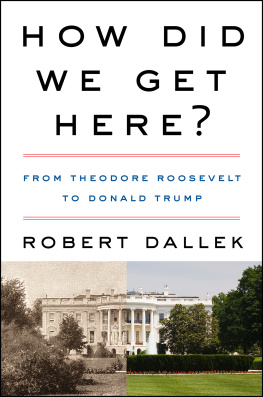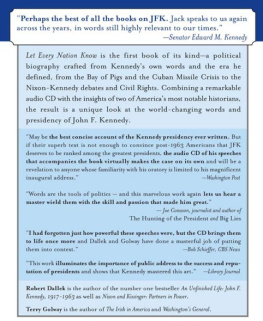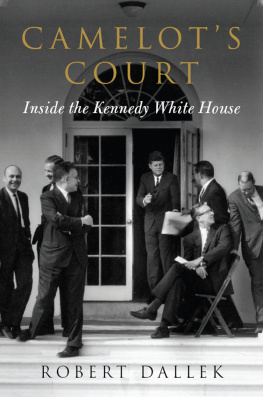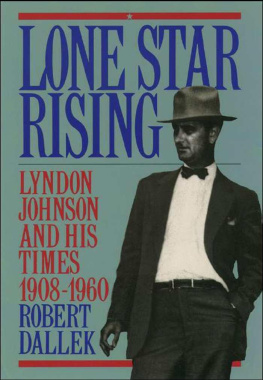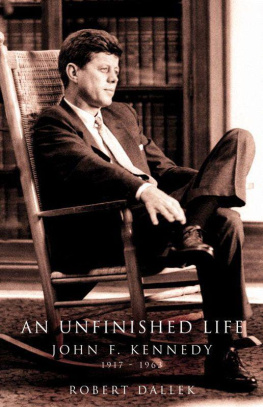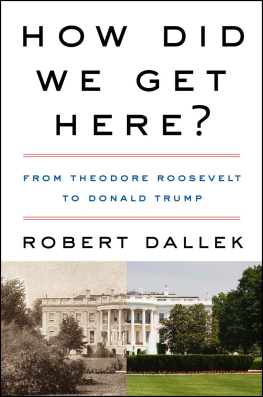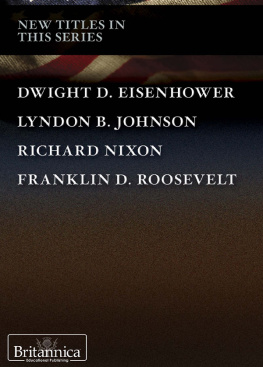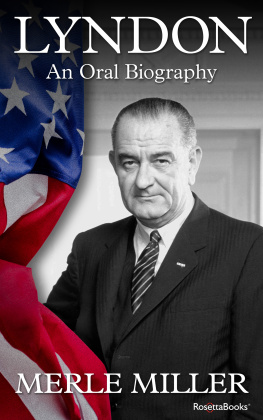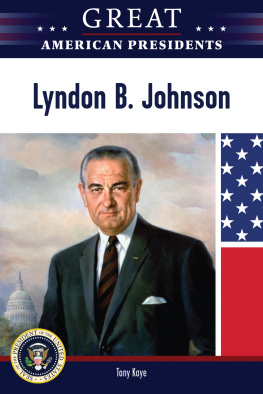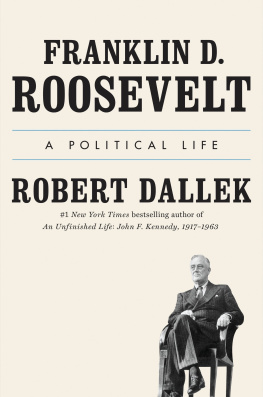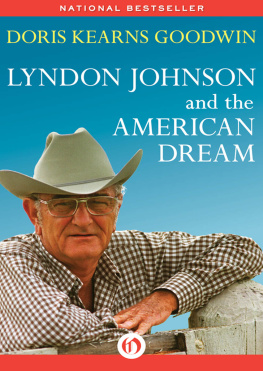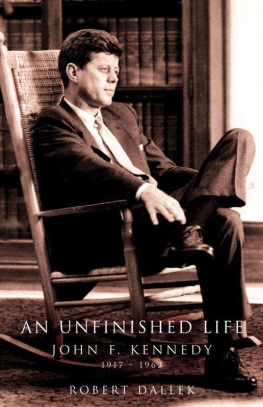LYNDON B. JOHNSON
Also by Robert Dallek
Democrat and Diplomat: The Life of William E. Dodd
Franklin D. Roosevelt and American Foreign Policy, 19321945
The American Style of Foreign Policy: Cultural Politics and Foreign Affairs
Ronald Reagan: The Politics of Symbolism
Lone Star Rising: Lyndon Johnson and His Times, 19081960
Hail to the Chief: The Making and Unmaking of American Presidents
Flawed Giant: Lyndon Johnson and His Times, 19611973
An Unfinished Life: John F. Kennedy, 19171963
LYNDON B. JOHNSON
PORTRAIT OF A PRESIDENT
Robert Dallek


Oxford New York
Auckland Bangkok Buenos Aires Cape Town Chennai
Dar es Salaam Delhi Hong Kong Istanbul Karachi Kolkata
Kuala Lumpur Madrid Melbourne Mexico City Mumbai Nairobi
So Paulo Shanghai Taipei Tokyo Toronto
Copyright 2004 by Robert Dallek
Published by Oxford University Press, Inc.
198 Madison Avenue, New York, New York 10016
www.oup.com
Oxford is a registered trademark of Oxford University Press
All rights reserved. No part of this publication may be reproduced,
stored in a retrieval system, or transmitted, in any form or by any means,
electronic, mechanical, photocopying, recording, or otherwise,
without the prior permission of Oxford University Press.
Library of Congress Cataloging-in-Publication Data
Dallek, Robert.
Lyndon B. Johnson : portrait of a president / Robert Dallek.
p. cm.
This work is a one volume abridgment of Dalleks 2-volume biography
of Lyndon B. Johnson v. 1. Lone star rising (1991); v. 2, Flawed giant (1998).
Includes bibliographical references (p.) and index.
ISBN 0-19-515920-9
1. Johnson, Lyndon B. (Lyndon Baines), 19081973.
2. PresidentsUnited StatesBiography.
United StatesPolitics and government19631969.
I. Dallek, Robert. Lone star rising.
II. Dallek, Robert. Flawed giant. III. Title.
E847.D26 2003 973.923092dc21 2003011360
9 8 7 6 5 4 3 2 1
Printed in the United States of America
on acid-free paper
To Matthew and Rebecca Dallek, our children,
and Michael Bender, our son-in-law
Contents
This relatively brief book is an abridgment of my two-volume life of Lyndon B. Johnson, published in 1991, Lone Star Rising, and in 1998, Flawed Giant. It is not a revision of those studies but an attempt to bring them within the reach of a wider audience, especially students, that has neither the time nor the inclination to read more than 1,200 pages on Johnsons life and times.
While preparing this condensed history, I had an opportunity to think anew about this extraordinary man and reconsider his impact on the national well-being. Controversies about Johnsons presidency, which remained relatively intense when I published the first volume twenty years after he had left office, have now, fifteen years later, subsided. Arguments over principal Great Society programs such as civil rights, Medicare-Medicaid, and federal aid to education have all but disappeared. Debate remains over how best to manage racial equality of treatment, to fund health insurance programs for the elderly and the poor, and to use federal monies to improve instruction and learning in the schools. But only a very small number of die-hard critics would suggest abolishing these social reforms.
Likewise, Johnsons great foreign policy failure, Vietnam, has become more an object of historical curiosity and an analog for what not to do in an overseas conflict than an ongoing source of angry debate. The defeat of Soviet communism and a search for foreign policies that can effectively meet the challenges of a postCold War worldabove all the threat of Islamic terrorism since September 11, 2001have eclipsed lingering resentments toward Johnsons unsuccessful fight to preserve South Vietnam from a Communist takeover.
The ebbing of the controversies might have pushed Johnson to the back of our historical consciousness. But to the contrary, he remains a larger-than-life figure whose political career continues to have current significance. His conscious effort to bring the South into the mainstream of the countrys economic and political life by ending segregation and funneling federal largesse to the region has revitalized the areas role in national politics. The fact that four of our last five presidentsJimmy Carter, Bill Clinton, and the two Busheshave been from Georgia, Arkansas, and Texas speaks to the renewed political power of the South. The altered standards for migration to the United States, the existence of departments of transportation and housing and urban development, consumer safety rules, environmental protections, public radio and television, food stamps, Head Start for preschool children, and legal services are only a handful of the wide-ranging programs that have had an enduring impact on the nation. Johnsons continuing hold on the countrys imagination is also the product of the more than nine thousand taped conversations he made in the White House. Periodic releases evoke memories of what an effective politician he was and provide an ongoing standard by which we can judge presidential leadership. It is no wonder that in a 1996 assessment of his presidency by thirty-two scholars, fifteen saw Johnson as a near-great president.
Johnsons legacy will continue to be a matter of historical debate. But whatever future biographers may say about him, I am confident that his impact on the country beginning in the 1930s and lasting until the end of the 1960s, when he left the national scene, will be remembered as considerable.
Although this book has no notes or bibliography, it is the product of fourteen years of research that underpinned my two volumes. Anyone wishing to learn the origins of what I assert in this shorter book should consult those studies.
Washington, D.C.
January 2003 | Robert Dallek |
LYNDON B. JOHNSON
ORIGINS
From Andrew Jackson to Ronald Reagan, the image of the self-made man has effectively served occupants of the White House. All who could, made much of their rags to riches odyssey. When I was young, poverty was so common we didnt know it had a name, Lyndon Johnson often said. A poor boy in a remote Texas town isolated from the mainstream of early twentieth-century American life, he grew up without indoor plumbing or electricity and sometimes made do on a bare subsistence diet. The rural small towns in which he received his elementary, secondary, and college schooling did little to broaden his horizons.
Yet Lyndon came to maturity believing he was speciala young man destined for exceptional things. And he was. Fueled by his early poverty, his ambition, like Lincolns, was a little engine that knew no rest. It helped carry him to the U.S. House of Representatives and Senate, the vice presidency and the White House. But ambition alone did not give him the wherewithal, the inner confidence, to imagine himself in the Congress or the Oval Office. His family history gave initial stirrings to such dreams. In one of the many paradoxes that would shape his life, Lyndon was not simply an impoverished farm boy who made good, but the offspring of prominent southern families. Although he suffered painful self-doubts throughout his life, his heritage was a constant source of belief in a birthright to govern and lead. Stories told by his parents and grandparents about famous, influential ancestors were a mainstay of his early years. From the first, he thought of himself not as a poor boy consigned to a life of hardship, but as an heir of Johnsons and Buntons, Baineses and Huffmans, men and women who commanded the respect of their contemporaries and shaped public affairs.
Next page

